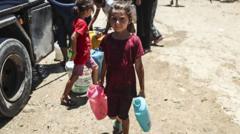Israeli Defense Minister Israel Katz has announced proposals to relocate all Palestinians in Gaza to a camp in Rafah, igniting substantial criticism and warnings of international law violations. Amid ongoing negotiations for a ceasefire, the Palestinian Authority and Hamas have yet to respond.
Israel's Defense Minister Proposes Relocation of Gaza's Population to Rafah Camp

Israel's Defense Minister Proposes Relocation of Gaza's Population to Rafah Camp
Israeli officials outline a controversial plan for a "humanitarian city" as the humanitarian crisis in Gaza escalates amidst ongoing conflict.
Israeli Defense Minister Israel Katz made headlines on Monday by stating that he has tasked the military with developing a strategy to relocate the entire Palestinian population of Gaza into a camp situated in Rafah, according to reports by Israeli media outlets. Katz envisions creating a "humanitarian city" that would initially accommodate approximately 600,000 individuals, with a future goal of housing the entire 2.1 million population within Gaza.
The minister aimed to reassure that individuals would undergo comprehensive security checks to confirm they are not affiliated with Hamas. However, he clarified that those relocated would be restricted from leaving the camp. Katz hinted at the possibility of initiating construction during a projected 60-day ceasefire, which discussions are underway to negotiate between Israel and Hamas.
The proposal has drawn sharp condemnation from human rights advocates, who label it an "operational plan for a crime against humanity." Michael Sfard, a prominent Israeli lawyer, emphasized that the intent appears to facilitate the transfer of Gaza’s population to the southern region, paving the way for deportation beyond the territory’s borders.
Moreover, the United Nations and various international humanitarian organizations have previously warned against the deportation of civilian populations in occupied territories, labeling such actions "ethnic cleansing" and a breach of international humanitarian law. Currently, there has been no response from the Palestinian Authority or Hamas regarding Katz's proposals.
On the same day, Israeli Prime Minister Benjamin Netanyahu discussed U.S. President Donald Trump’s vision of resettling Gaza's population in a meeting at the White House. Netanyahu affirmed Trump's suggestion that individuals should have the choice to stay or leave, expressing optimism about cooperation with surrounding nations to offer Palestinians a better future.
Conversely, in March, several Arab states supported an alternative proposal originating from Egypt that suggested using a $53 billion fund for Gaza’s reconstruction while keeping the Palestinian people in their current locations. This proposal was firmly opposed by Israel and the U.S., who criticized it for failing to reflect the operational realities on the ground.
As tensions heighten, Palestinians harbor fears reminiscent of the Nakba, or "catastrophe," from 1948, when countless individuals were displaced. Presently, many of Gaza's residents are facing dire conditions; reports indicate that over 57,500 people have died since the onset of the recent military conflict, which was triggered by a cross-border assault on October 7, which took an estimated 1,200 lives and saw 251 taken hostage.
The ongoing conflict has drastically escalated the humanitarian crisis in the Gaza Strip, where the destruction of infrastructure and the collapse of vital services have left much of the population displaced and in desperate need of assistance. Over 90% of residential structures are reportedly damaged or destroyed, and acute shortages of food, fuel, medicine, and shelter continue to plague the residents.




















